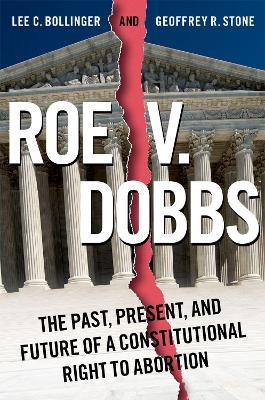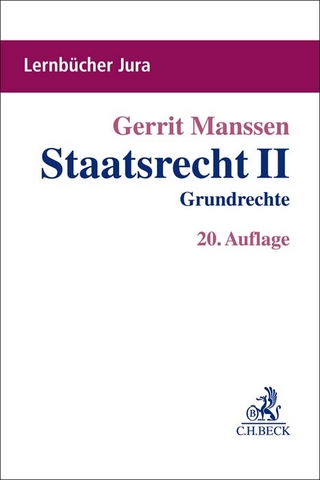
Roe v. Dobbs
Oxford University Press Inc (Verlag)
978-0-19-776036-9 (ISBN)
What makes this subject unique is how it intersects with our own lives, since both Bollinger and Stone were law clerks at the Supreme Court in the year that Roe was decided (1973)--Stone for Justice William Brennan and Bollinger for Chief Justice Warren Burger. During the Court's 1972 Term, when Roe was decided, the Court was in a state of flux. President Nixon had just appointed four Justices to the Court--Burger, Blackmun, Powell, and Rehnquist. The era of the Warren Court was clearly over. In those days, the Justices were non-partisan, often joined opinions across the political/ideological spectrum, and approached cases with an open mind. That in large part explains why the Court could reach the decision it did in Roe, with five of the six Republican-appointed Justices and two of the three Democratic-appointed Justices in the majority, and one Republican-appointed justice (Rehnquist) and one Democratic-appointed justice (White) in dissent. It was a different Court and a different era.
Lee C. Bollinger served as Columbia University's 19th president from 2002 to 2023. He is Seth Low Professor of the University, a member of the Columbia Law School faculty, and one of the nation's foremost First Amendment scholars. Geoffrey R. Stone is the Edward H. Levi Distinguished Service Professor at the University of Chicago. Mr. Stone joined the faculty in 1973, after serving as a law clerk to Supreme Court Justice William J. Brennan, Jr. He is a preeminent constitutional law scholar.
Acknowledgments
List of Contributors
Dialogue
Lee C. Bollinger and Geoffrey R. Stone
Part One The Supreme Court: Roe v. Dobbs
1. Liberal Critics of Roe
David A. Strauss
2. Equality Emerges as a Ground for Abortion Rights in and After Dobbs
Cary Franklin & Reva Siegel
Part Two Close Readings of Roe
3. Why Was Roe v. Wade Wrong?
Jonathan Mitchell
4. Justice Blackmun Got it Right in Roe v. Wade
Erwin Chemerinsky
Part Three The Path from Roe to Dobbs
5. Abortion, Partisan Entrenchment, and the Republican Party
Jack M. Balkin
6. Some Realism About Precedent, In the Wake of Dobbs
Michael W. McConnell
Part Four Close Readings of Dobbs
7. The Dobbs Gambit: Gaslighting at the Highest Level
Khiara M. Bridges
8. Dobbs and the Travails of Due Process Traditionalism
Cass R. Sunstein
9. Should Gradualism Have Prevailed in Dobbs?
Richard M. Re
10. Dobbs' Democratic Deficits
Melissa Murray & Katherine Shaw
Part Five Historical Perspectives
11. The Failure of Dobbs: The Entanglement of Abortion Bans, Criminalized Pregnancies, and Forced Family Separation
Dorothy Roberts
12. A Requiem For Roe: When Property Has No Privacy
Michele Bratcher Goodwin
13. Where History Fails
Nancy F. Cott
14. How Contraception and Abortion Got Divorced
Linda Gordon
15. The Antiabortion Movement and the Punishment Prerogative
Mary Ziegler
Part Six International Perspectives
16. Abortion Policy Aimed at Promoting Life As Much As Possible
Mark Tushnet
17. American Exceptionalism and the Comparative Constitutional Law of Abortion
Tom Ginsburg
Part Seven Implications for the Future
18. Reproductive Technologies and Embryo Destruction After Dobbs
Glenn Cohen
19. Dobbs and Our Privacies
Aziz Z. Huq & Rebecca Wexler
20. The Unraveling: What Dobbs May Mean for Contraception, Liberty, and Constitutionalism
Martha Minow
Closing Dialogue
Lee C. Bollinger and Geoffrey R. Stone
| Erscheinungsdatum | 14.02.2024 |
|---|---|
| Verlagsort | New York |
| Sprache | englisch |
| Maße | 165 x 196 mm |
| Gewicht | 680 g |
| Themenwelt | Recht / Steuern ► EU / Internationales Recht |
| Recht / Steuern ► Öffentliches Recht ► Verfassungsrecht | |
| Sozialwissenschaften ► Politik / Verwaltung ► Staat / Verwaltung | |
| Sozialwissenschaften ► Soziologie | |
| ISBN-10 | 0-19-776036-8 / 0197760368 |
| ISBN-13 | 978-0-19-776036-9 / 9780197760369 |
| Zustand | Neuware |
| Informationen gemäß Produktsicherheitsverordnung (GPSR) | |
| Haben Sie eine Frage zum Produkt? |
aus dem Bereich


